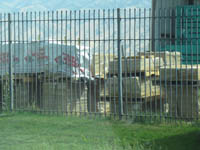UPCOMING EVENTS
View full calendarHow Do My Actions Affect Water Quality
Check out how different land uses affect water quality and what you can do.
 Possible Pollutants: • Fertilizers • Pesticides • Sediment • Oil and gas • PPCPs • Stuff down storm drains
• Nitrous oxides from combustion engines (autos)
Possible Pollutants: • Fertilizers • Pesticides • Sediment • Oil and gas • PPCPs • Stuff down storm drains
• Nitrous oxides from combustion engines (autos)
Affect on Water Quality:
Increased temperature: Riparian vegetation may be cleared in order to have easier access to the river. Less vegetation cover means more sun can reach the water surface and increase the temperature of the water. The metabolisms of fish and other aquatic life are affected by temperature. Certain fish and other aquatic life can only survive in cold water.
Increased turbidity: If excavation occurs near streams the excess sediments may wash into the streams during storm events. Also, the excavation may make banks unstable and they may erode more easily. Heavy loads of suspended solids can make it hard for fish to see their prey and even clog fish gills and filter-feeding devices of water bugs.
Increased Nitrates: Fertilizer often has nitrates. Excess fertilizer from lawns, golf courses and fields can wash into storm drains which lead directly to streams and rivers. Also combustion engines (autos) convert nitrogen gas to nitrous oxides, which come down as acid rain and result in increased nitrogen concentrations. Nitrates act as a fertilizer and can cause excessive plant growth and affect the dissolved oxygen concentration in the water, which is vital for the survival of most aquatic organisms.
Low Dissolved Oxygen: Warmer water can hold less dissolved oxygen than cooler water. Also, when bacteria decompose dead plant material they use up dissolved oxygen. Dissolved oxygen is important for the survival of many aquatic organisms.
Mitigation of adverse affects on water quality:
Construction operators involved in clearing, grading, and excavating activities that disturb 1 acre or more, (including smaller sites in a larger common plan) are required to obtain coverage under a National Pollutant Elimination System (NPES) permit for their stormwater discharges.
 Possible Pollutants: • Sediment • Biological debris
Possible Pollutants: • Sediment • Biological debris
Affect on Water Quality:
Increased temperature: Riparian vegetation may be cleared for roads and logging purposes. Less vegetation cover means more sun can reach the water surface and increase the temperature of the water. The metabolisms of fish and other aquatic life are affected by temperature. Certain fish and other aquatic life can only survive in cold water.
Increased turbidity: If excavation occurs near streams the excess sediments may wash into the streams during storm events. Also, the excavation may make banks unstable and they may erode more easily. Heavy loads of suspended solids can make it hard for fish to see their pray and even clog fish gills and filter-feeding devices of water bugs.
Low Dissolved Oxygen: Warmer water can hold less dissolved oxygen than cooler water. Dissolved oxygen is important for the survival of many aquatic organisms.
Mitigation of adverse affects on water quality:
National Management Measures to Control Nonpoint Source Pollution from Forestry
For more information click here.
Possible Pollutants: • Nitrogen • Phosphorous • Pesticides
Affect on Water Quality:
Increased temperature: Livestock may overgraze riparian vegetation. Less vegetation cover means more sun can reach the water surface and increase the temperature of the water. The metabolisms of fish and other aquatic life are affected by temperature. Certain fish and other aquatic life can only survive in cold water.
Increased turbidity: When livestock trample riverbanks they become steepened and unstable which increases sediment input. Heavy loads of suspended solids can make it hard for fish to see their pray and even clog fish gills and filter-feeding devices of water bugs.
Increased Nitrates: Animal waste contains nitrates. If excess animal waste is washed into streams and rivers over it can cause excess plant growth with affects dissolved oxygen concentrations in the water. Dissolved oxygen is vital for the survival of most aquatic organisms.
Low Dissolved Oxygen: Warmer water can hold less dissolved oxygen than cooler water. Dissolved oxygen is important for the survival of many aquatic organisms.
Mitigation of adverse affects on water quality:
Owners of Concentrated Animal Feeding Operations (CAFO’s) and some Animal Feeding Operations (AFO’s)need to obtain a permit.
Pasture, Rangeland, and Grazing Operations
Pasture, Rangeland, and Grazing Operations - Best Management Practices (BMPs)
Possible Pollutants: Metals • Sediment • Acid Mine Drainage (AMD)
Affect on Water Quality:
Increased temperature: Riparian vegetation may be cleared in order to have easier access to metals. Less vegetation cover means more sun can reach the water surface and increase the temperature of the water. The metabolisms of fish and other aquatic life are affected by temperature. Certain fish and other aquatic life can only survive in cold water.
Increased turbidity: If excavation occurs near streams the excess sediments may wash into the streams during storm events. Heavy loads of suspended solids can make it hard for fish to see their pray and even clog fish gills and filter-feeding devices of water bugs.
Low pH: Acidic water may form from a chemical reaction of surface water (rainwater, snowmelt, pond water, etc.) and shallow subsurface water containing rocks with sulfur-bearing minerals. This reaction produces sulfuric acid. Heavy metals may be leached from rocks that come in contact with the acid, resulting in fluids that may be highly toxic and have harmful impacts on humans, wildlife and plants.
Mitigation of adverse affects on water quality:
Possible Pollutants: • chemicals • high temperature water discharge varies greatly depending on the industry
Affect on Water Quality:
Increased temperature: High temperature water may be discharged from power plants into streams and rivers. The metabolisms of fish and other aquatic life are affected by temperature. Certain fish and other aquatic life can only survive in cold water.
Chemicals: Depending on the type of industry or factory, if managed poorly, harmful chemicals or other substances may enter streams and rivers.
Low Dissolved Oxygen: Warmer water can hold less dissolved oxygen than cooler water. Dissolved oxygen is important for the survival of many aquatic organisms.
Mitigation of adverse affects on water quality:

